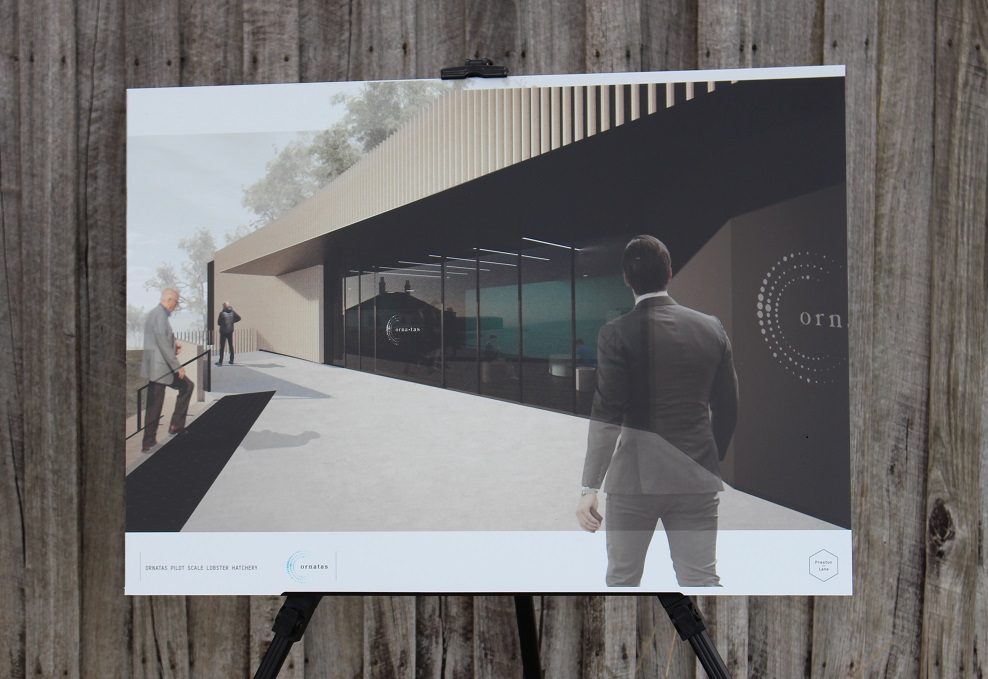Celebrations are in order for Dr Jaime Willis, as his PhD journey with the ARC Research Hub for Sustainable Onshore Lobster Aquaculture at IMAS has successfully come to a close!
Jaime has already landed a permanent Postdoctoral position abroad and will be making an immediate move to Denmark. The ARC Research Hub for Sustainable Onshore Lobster Aquaculture, led by Hub Director, Professor Greg Smith, takes immense pride in Jaime's accomplishments, with special acknowledgment to his exceptional supervisor at the University of Auckland, Professor Andrew Jeffs.
Professor Jeffs' unwavering commitment, enthusiasm, guidance and inspiration played a crucial role in Jaime's success.
We’ve just returned from a productive week in Townsville with our commercial partner, Ornatas Pty Ltd, where we had our annual milestone planning workshop. The trip also included a fascinating tour of their onshore aquaculture facility to see the amazing research outcomes already taking place as well as the continuous improvements and refinements being implemented as we speak. It’s really inspiring to be working with such a talented and enthusiastic team of research specialists led by Professor Greg Smith, whose expertise and determination to succeed is infectious!
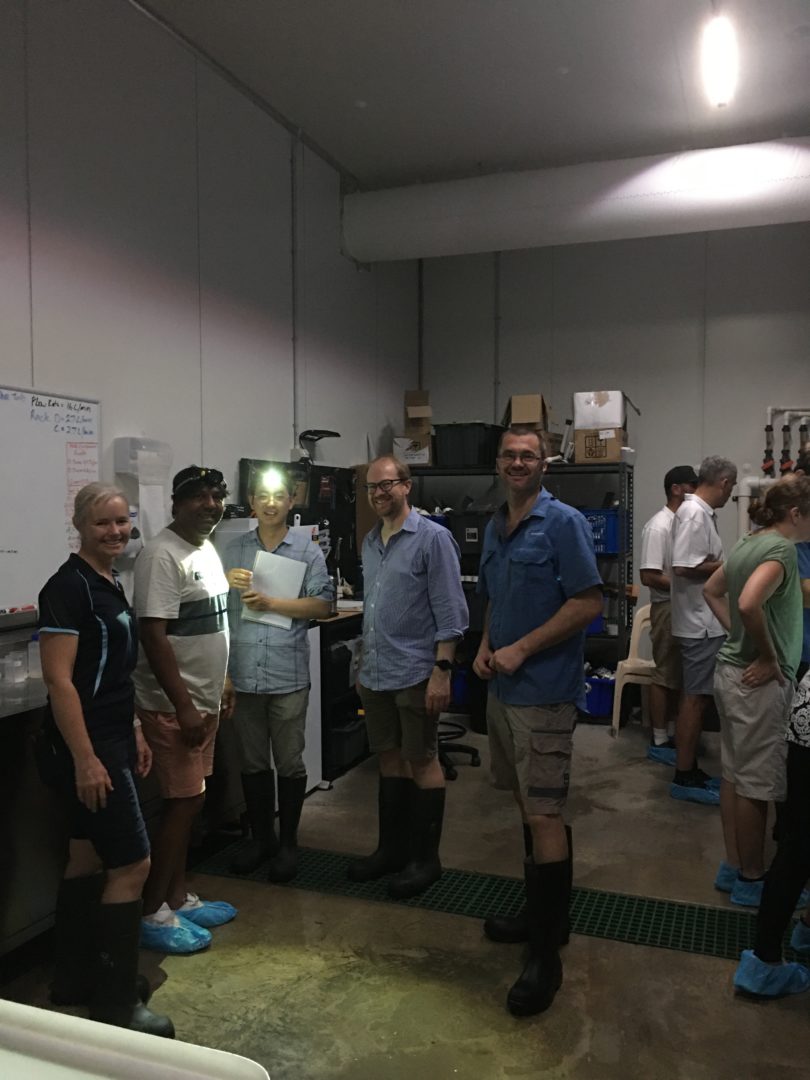
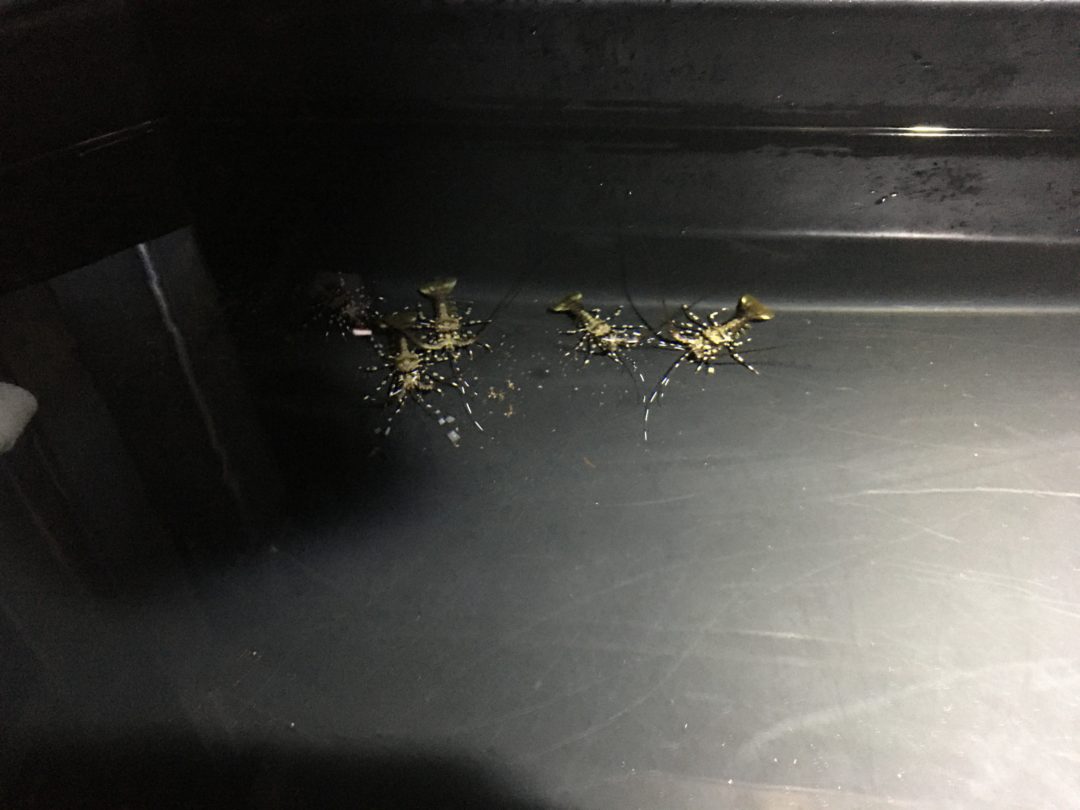
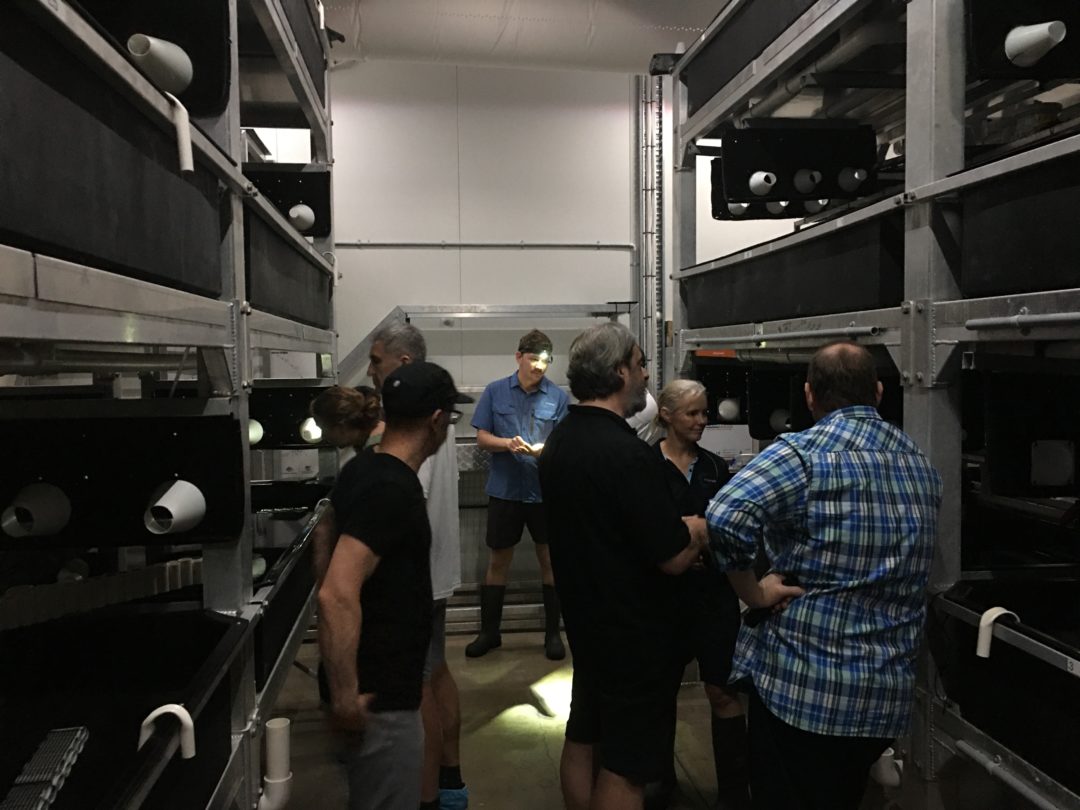
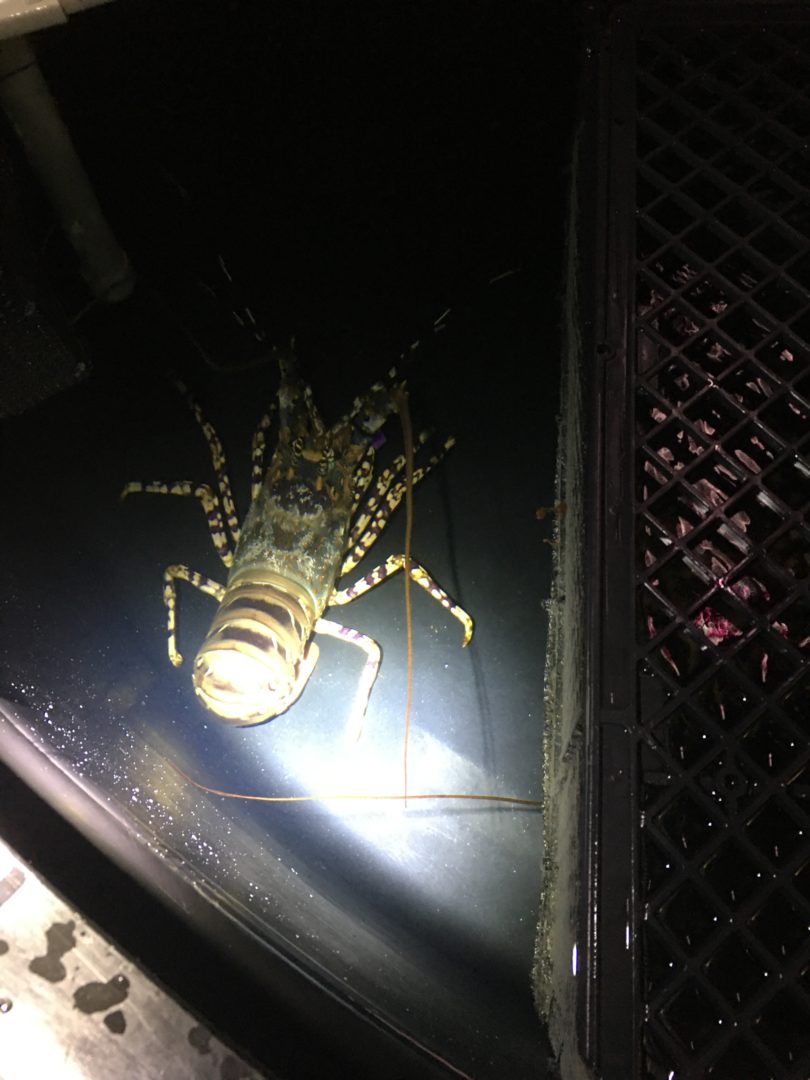
We are delighted to let you know that our very talented Hub PhD Student Tara Kelly has won the 2023 UTAS 3MT Competition!
Not only were the judges impressed with her 3MT entry, but the broader HDR community have also voted and awarded her the People’s Choice Prize this year! How amazing is that!
Tara's winning entry will now progress into the Asia-Pacific 3MT Finals competition (Virtual).
Congratulations on a fantastic presentation Tara and a stunning result.
We are very proud of all your achievements.
A HUGE congratulations to the newest Doctor in the ARC Research Hub!
Andrea Williamson (nee Wirtz) commenced her PhD scholarship at Institute for Marine and Antarctic Studies (IMAS) with the ARC Research Hub for Rock Lobsters November 2018. Her PhD project, titled “Aquafeed development of juvenile slipper lobster (<i>Thenus australiensis</i) focused on identifying potential protein sources for inclusion in specialised feed formulation and to increase our knowledge in protein requirements and nutritional physiology.
Her hard work and dedication has culminated in her successful thesis acceptance yesterday (06/07/2023). But there's no time to rest, as she’s already been snapped up as a Post Doc on another high profile project at IMAS, working with the endangered Red Handfish.
Congratulations on a sterling effort Andrea!
Your success is our success.
Thank you for being a valued member of our ARC Research Hub family.
We are very proud to announce that Adele Moyes, Senior Technical Officer (Systems) – ARC Research Hub for Sustainable Onshore Lobster Aquaculture, at the Institute for Marine and Antarctic Studies (IMAS) has been successful in securing a place in the highly respected National Seafood Industry Leadership Program (NSILP) 2023.
The NSILP commenced in Hobart, Tasmania on 14 March, 2023. This national leadership program is funded by the Australian Government through the Fisheries Research and Development Corporation (FRDC) and is managed and facilitated by Affectus. The program extends throughout six calendar months and concludes in Canberra in September 2023.
NSILP is the only national industry specific leadership program for the seafood industry and has been informed and developed in consultation with and feedback from the industry. The program focuses on developing practical skills that participants can apply at a personal, business, and national organisation industry level. Affectus provides skills sessions and practical activities that enhance participants knowledge and confidence to lead the industry into the future.
NSILP caters to individuals aspiring to leadership roles at all levels of the seafood industry, whether as workplace supervisors, industry representatives, or even with national and international leadership aspirations. Throughout the program, NSILP participants will have opportunities to interact with industry decision-makers. The rigorous selection process this year ensures that participants from various sectors and the value chain can connect with industry leaders and build networks. Industry support for the program is greatly appreciated.
You may be surprised to know that our Tasmania-based Research Hub works with tropical lobster species and not temperate (colder water/Southern) species. Here, we sit down with Senior Technical Officers, Molly Stokes and Larnie Linton to learn some fascinating facts about three different lobster species and why tropicals are best suited for onshore aquaculture.
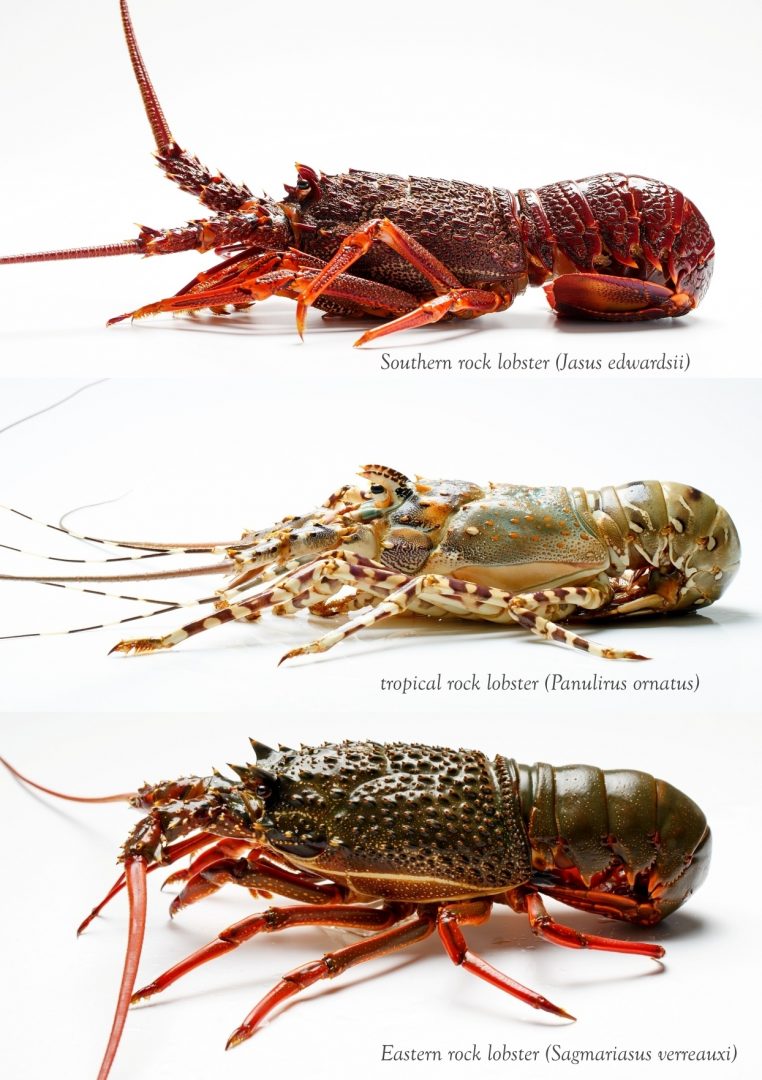
Tasmania has two native species of lobster, the Eastern rock lobster (Sagmariasus verreauxi) and well loved Southern rock lobster (Jasus edwardsii). Both of which the Research Hub chief investigators have worked on in the past. Although Tasmanians, and people across the globe, love catching and eating local species, it turns out they aren't well suited for onshore aquaculture.
"The Tasmanian species are adapted to colder water, around 20ᵒC for the Southerns and 26ᵒC for the Easterns, which along with their long larval life history, means they are slow growing. The longer it takes to grow a lobster, the more money it costs to grow it to plate size", says Molly. "The tropical rock lobster (Panulirus ornatus) prefers its home to be around 28ᵒC or higher and is faster growing."
Larnie Linton has been working in aquaculture of tropical rock lobsters for over 20 years and has made some remarkable observations on the broodstock (reproductive adults). "One of my favourite discoveries has been that the tropical lobsters have unique markings on and between the horns above their eyes. It is just like a finger print. We can now use a 'cheat sheet' to identify individuals, which makes it easier for me to tag them correctly and shorten their handling time out of water."
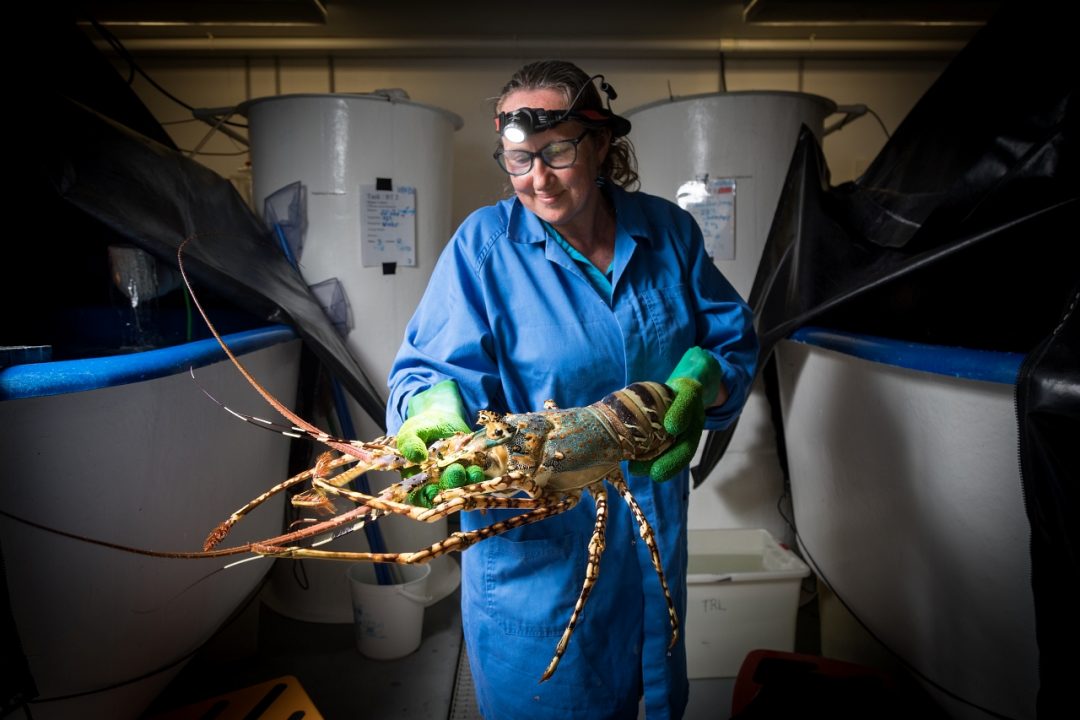
Eastern Rock Lobsters
Southern Rock Lobsters
Tropical Rock Lobsters
Headquartered at the Institute for Marine and Antarctic Studies (IMAS), the ARC Research Hub for Sustainable Onshore Lobster Aquaculture was established through a prestigious $5 million Australian Research Council (ARC) grant awarded to the University of Tasmania.
“Through this Research Hub, we’re building the knowledge required to establish the world’s first sustainable onshore lobster aquaculture industry, with our research outcomes targeted at positioning Australia at the forefront of onshore lobster aquaculture,” Research Hub leader, Professor Greg Smith said.
“It’s about providing alternate solutions for lobster culture in bio-secure and cost effective onshore systems, with an opportunity for technology transfer to other aquaculture sectors.”
The Research Hub will harness the experience of a diverse group of researchers, technical staff and industry partners, using state-of-the-art research and commercial facilities and advanced manufacturing. Key partners in the IMAS-led project include the University of Auckland, University of the Sunshine Coast, and Australian industry partners Ornatas and PFG Group, representing a total research investment in excess of $26 million.
“The project will deliver advances in traditional lobster aquaculture practices that will underpin the establishment of a new industry. Research outcomes will be closely connected to commercial success by linking sustainability and technological advances to the development of a successful differentiated export lobster industry for regional Australia,” Prof Greg Smith said.
“Potential research outcomes include reduced environmental impacts, workforce training, new product development, improved aquaculture food safety and biosecurity, and the scientific advancement of aquaculture as a critical technology.”
The Research Hub will build on work undertaken in the ARC Research Hub for Commercial Development of Rock Lobster Culture Systems, which was completed in 2019. “This work was a breakthrough for aquaculture, closing the lifecycle and developing unique aquaculture systems for the mass production of lobster seedstock,” Prof Greg Smith said.
“Along with our early work funded by the Fisheries Research and Development Corporation, this research has advanced our knowledge and made creating new sustainable commercial aquaculture ventures possible. It has also allowed the Research Hub to undertake the research that will complete the life cycle of lobster aquaculture in commercial facilities.”
Commercial partner, Ornatas, CEO Scott Parkinson said the company has been running for three years now.
“We started off by joining forces with the University of Tasmania, who have been working with tropical rock lobsters for the last 10 years,” Mr Parkinson said.
“The research being developed is something that hasn’t been able to be achieved by any other organisation. This is really the holy grail of the aquaculture industry and is born and bred from Australia.”
Aquaculture researchers, foodies, and growers of Tropical Rock Lobster and Moreton Bay Bugs took part in a blind taste test in Hobart yesterday, to understand the differences between aquaculture-grown Moreton Bay Bugs and those caught in the wild.
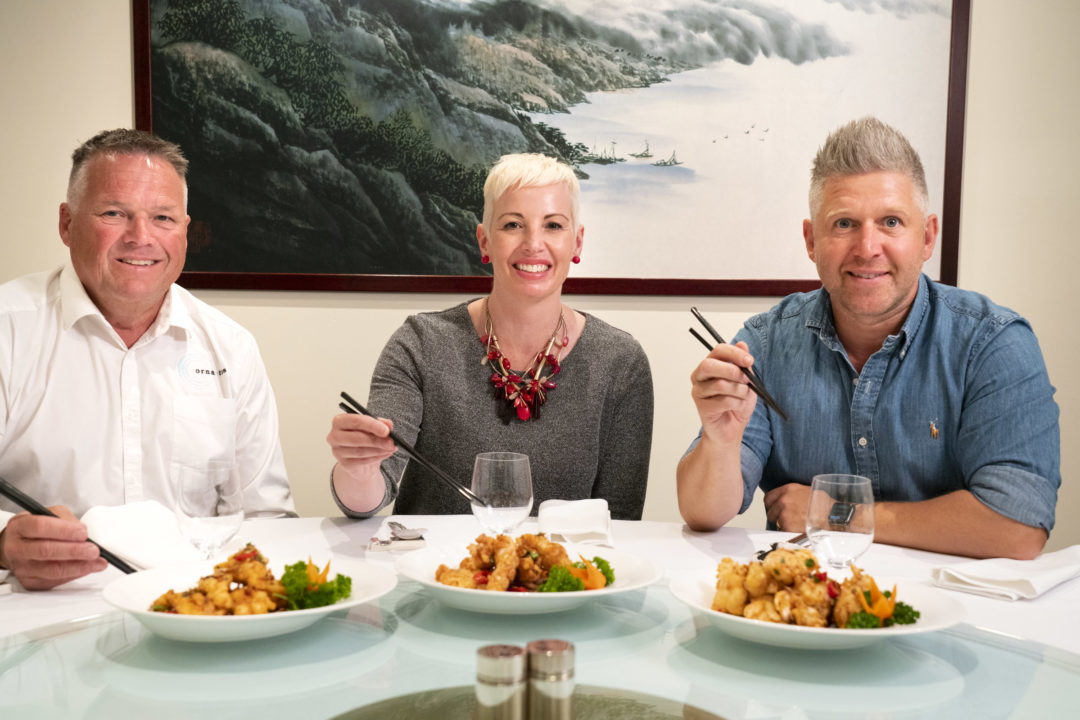
Held at Me Wah Restaurant in Sandy Bay, the taste test was attended by a selection of Tasmania’s most well-known foodies, including Massimo Mele and Amit Laud. It included Moreton Bay Bugs Thenus australiensis grown on a formulated feed developed in the ARC Lobster Research Hub.
Me Wah Director, Mr Stephen Tso, said he was intrigued to taste and compare the new product, and experiment with creating a signature dish.
“Our customers love seafood, so having a reliable supply of Moreton Bay Bugs that taste great would be an excellent thing for Me Wah.”
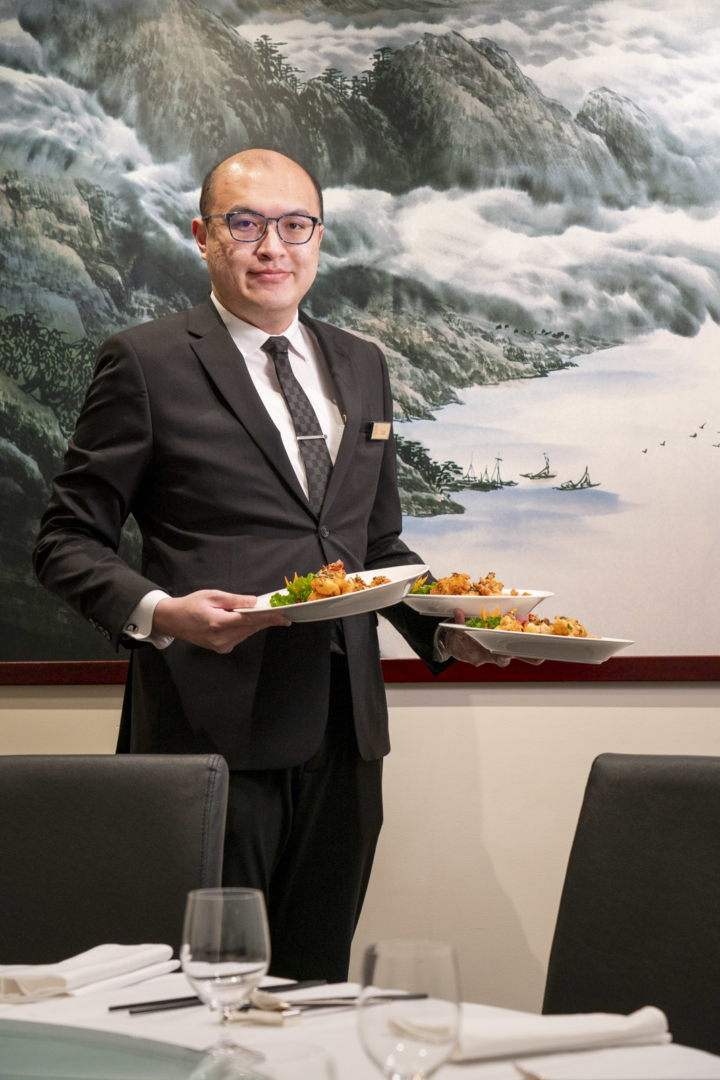
Research Hub Director, Professor Greg Smith said developing feeds that meet nutritional requirements, facilitate animal growth and result in a quality product is a central component of the research program.
“We’re striving to position Australia as the world leader in sustainable onshore systems for lobster aquaculture, by developing commercially relevant practices and technology that will enable sustainable onshore rearing of hatchery produced lobsters,” Professor Smith said.
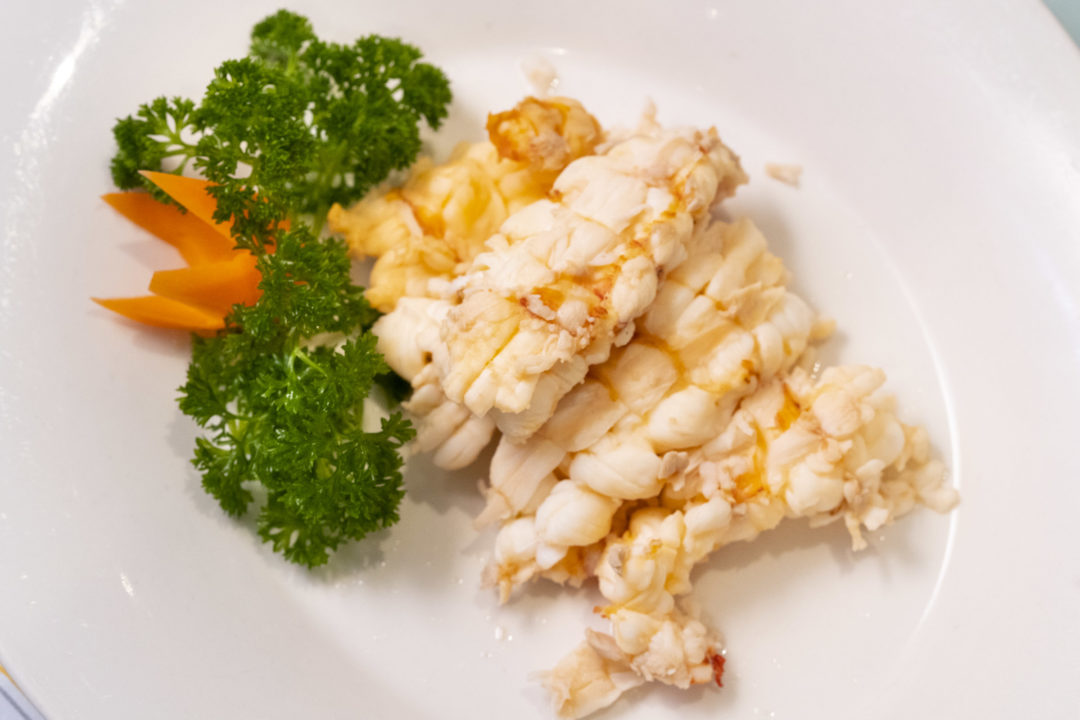
Mr Martin Rees, Executive Director of Ornatas, said that he was excited to taste the product himself and get feedback from local food experts.
“Ornatas is dedicated to building a sustainable future for seafood,” Mr Rees said.
Photography by Steve Pearce
Last month, Ornatas were pleased to host a visit from several of Queensland’s state government departments at our Toomulla Beach Aquaculture Facility. On the 15th of September representatives from Queensland’s Department for Parks and Wildlife, Department of Agriculture and Fisheries, Department of Transport and Main Roads, Department of Natural Resources, Mines and Energy, Queensland Rail and Townsville City Council, met with our team, Board of Directors and partners SMEC Engineering, Wild Environment and Milford planning.
The visit was hosted to provide the government departments with an opportunity to see the site, discuss our operations and upcoming projects our Toomulla beach site. The group spent the day touring the hatchery and viewing the facility’s infrastructure and were also introduced to one of our hatchery’s Tropical Rock Lobsters.
Ornatas Hatchery Manager Anna Overweter introducing the group to one of our Tropical Rock Lobsters
The following day, the Ornatas team were also pleased to host Cr Jenny Hill, Mayor of the City of Townsville, who was shown around the facility and Morton Bug hatchery by Hatchery Manager Anna Overweter. We would like to thank Cr Hill and the Townsville Council for their ongoing support. The visits provided an exciting opportunity for us to share our recent construction of the world-first Rock Lobster Hatchery Facility, as well as meet our rapidly expanding team, painting an exciting future for the Toomulla Beach aquaculture facility.
Townsville site manager Simon Davis talking about the construction and development of the Ornatas Aquaculture Facility.
This article was originally published at ornatas.com.au
A development application was lodged today with Kingborough Council for construction of the world’s first rock lobster hatchery at the Institute for Marine and Antarctic Studies (IMAS) Taroona research laboratory site.
The application was made by Ornatas Pty Ltd, a Tasmanian company that the University of Tasmania is partnering with to commercialise world-leading research that will for the first time enable tropical rock lobster production on a commercial scale.
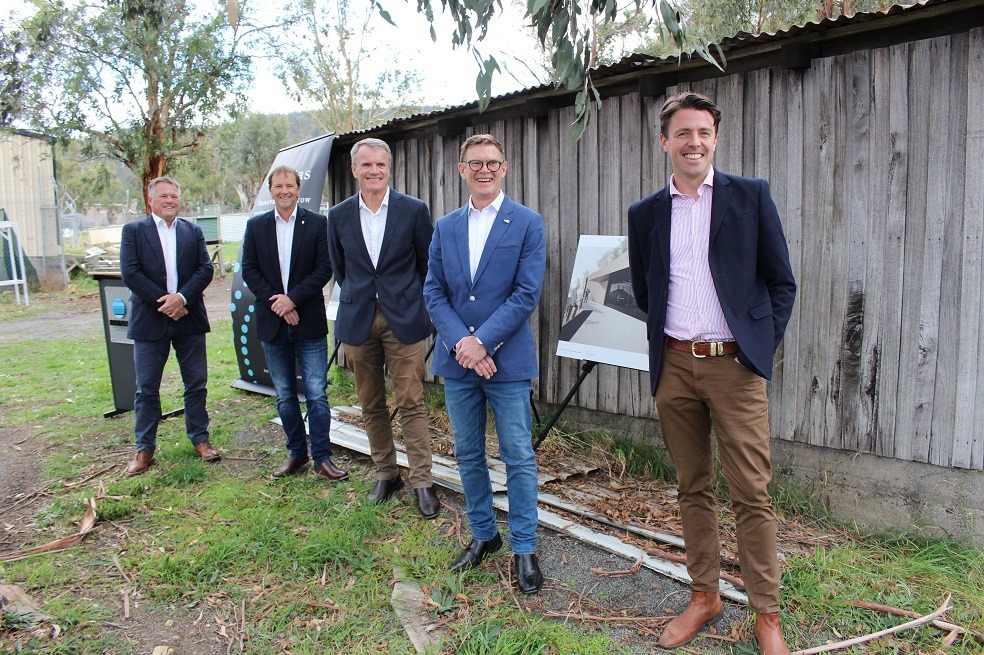
IMAS Executive Director Terry Bailey said the unique facility would allow long-running lobster research at the Nubeena Crescent site to enter its next phase.
“IMAS scientists are leading the world in research to enable rock lobster aquaculture on a commercial scale.
“The University has partnered with Ornatas to realise the potential of this exciting science, developed during almost 20 years of research at Taroona.
“Building the world’s first tropical rock lobster hatchery will raise new research questions for our scientists, as lobsters have a complex life cycle and have never been reared on this scale before,” Mr Bailey said.
“The Australian Government recently announced new funding to help address these challenges through the ARC Research Hub for Sustainable Onshore Lobster Aquaculture.
“The hatchery will include a laboratory to support this research, complementing our existing facilities on the site.
“If the DA is approved, construction of the hatchery will provide ongoing research and commercial benefits, demonstrating the practical contribution that cutting‑edge science such as this can make to the Tasmanian community and economy,” Mr Bailey said.
The new state-of-the-art hatchery will be a two-storey 1805m2 building, replacing existing sheds that were part of the former DPIPWE site.
The building will include a research laboratory, lobster hatchery, plant equipment space, and offices.
Wastewater will be discharged through the IMAS pump station after sterilisation, with the highest level of biosecurity to ensure no contaminants enter the river.
The tiny lobster hatchlings produced at Taroona will be grown out to marketable size at an Ornatas site near Townsville, Queensland.
In November the Tasmanian Planning Commission approved changes to the planning scheme to allow development activities on the Nubeena Crescent site associated with the research undertaken in the area.
At the request of residents, a forested part of the site adjacent to the beach has been gifted to Kingborough Council to be managed as part of the Taroona Foreshore Park.
